Abuja - High-protein diets, like the popular Dr Dukan diet, increase the long-term risk of developing kidney disease and have a negative effect on renal urinary and morphological markers.
What's more, they may promote serious pathologies like nephrolithiasis (calcium kidney stones) because they drastically reduce urinary citrate (an inhibitor of calcium salt crystallization) and urinary pH, and increase urinary calcium (to compensate for the metabolic acidity caused by excess protein).
University of Granada scientists have proved this in an experiment in rats that examined the effects of a high-protein diet on renal urinary, plasma and morphological parameters.
The researchers studied 20 Wistar rats, divided into two groups of 10. The first group were fed a high-protein diet of commercial hydrolysed protein supplements with a 45% protein level. The control group were fed a normal protein diet. The experiment lasted 12 weeks, which is the equivalent of 9 years in human terms.
10% weight loss
The results showed that the rats on a high-protein diet lost up to 10% of their body weight over the 12 weeks with no improvement in their plasma lipid profile.
Moreover, urinary citrate in these rats was 88% lower and urinary pH was 15% more acidic. In the animals fed a high-protein diet, kidney weight increased by 22%, glomerular area – the network of capillaries that filter blood in the kidneys – by 13%, and the mesangium – a collagen structure surrounded by these capillaries –by 32%.
Serious long-term effects
The results of this study led the principal author, Dr Virginia A Aparicio of the University of Granada Department of Physiology, to stress the need to closely monitor anyone on a high-protein diet. The Dukan diet, and others like it, can have serious long-term adverse effects on their health.
She warns that the negative effects of high-protein diets on the kidney also depend on the presence of other nutrients in the diet.
“Eating large amounts of fruit and vegetables reduces the risk of kidney stones forming – probably due to their high potassium and magnesium content, which compensates for the acidity of the high-protein diet," Dr Aparicio concludes.
The Top 10 High Protein Foods - Clear and Detailed Information for Your Best Protein Sources
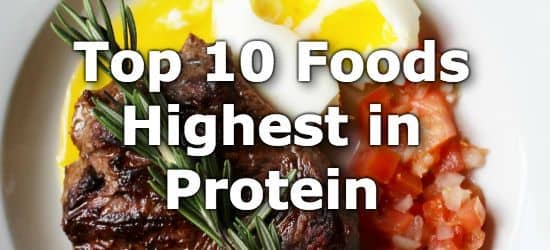
Protein is a macro nutrient necessary for the proper growth and function of the human body.
There is considerable debate over the amount of protein a person needs to consume per day, the current recommended daily intake (RDI) for protein is 46 grams for women aged 19-70, and 56 grams for men aged 19-70. Any excess protein is turned into energy by the body, and it is controversial whether this excess protein causes a strain on the liver.
A deficiency in protein leads to muscle atrophy, and impaired functioning of the human body in general. High protein foods include meat, fish, cheese, tofu, beans, lentils, yogurt, eggs, nuts, and seeds.

#1: Fish (Tuna, Salmon, Halibut)
Protein in 100g 3oz Fillet (85g) Protein to Calorie Ratio
26g 22g 1g protein per 4.5 calories
Other fish high in protein per fillet(3oz or 85g): Tuna (22g), Salmon (22g), Halibut (22g), Snapper (22g), Perch(21g), Flounder and Sole (21g), Cod (20g), Tilapia (17g).
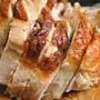
#2: Lean Chicken (Chicken Breast)
Protein in 100g 3oz serving (85g) Protein to Calorie Ratio
18.3g 16g 1g protein per 4.6 calories
More Chicken and Turkey: Chicken Leg - Drumsticks (60g) provides 16g protein. Chicken Thigh (37g) provides 9g protein. 3oz serving of Turkey Breast (85grams) provides 26g protein.
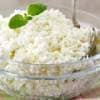
#3: Cheese (Non-fat Mozzarella)
Protein in 100g 1oz Slice (28g) Protein to Calorie Ratio
32g 9g 1g protein per 4.7 calories
Other cheese high in protein per ounce(28g): Low-fat Cottage Cheese (5g), Low-fat Swiss Cheese (8g), Low-fat Cheddar (6g), Parmesan (10g), Romano (9g). *Low or Non Fat Mozzarella and Cottage Cheese provide the most protein per calorie, full fat cheeses typically only provide 1g protein per 20 calories, and are less optimal sources of protein.
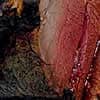
#4: Lean Beef and Veal (Low Fat)
Protein in 100g 3oz Slice (85g) Protein to Calorie Ratio
36g 31g 1g protein per 5.3 calories
T-Bone Steak 3oz (28g) provides 19g of protein, 1 Piece of Beef Jerky (20g) provides 7g of protein.
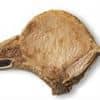
#5: Pork Loin (Chops)
Protein in 100g 1 Chop (137g,~5oz) Protein to Calorie Ratio
30g 41g 1g protein per 5.4 calories
Sirloin Roast 3oz (28g) provides 23g of protein, Ham 3oz (28g) provides 18g of protein, 1 slice of bacon (8g) provides 3g of protein.

#6: Tofu
Protein in 100g 3oz Slice (85g) Protein to Calorie Ratio
7g 6g 1g protein per 7.4 calories
1 cup (252g) of firm tofu provides 20g protein. 1 cup of soft tofu (248g) provides 16g protein. 1 cup of tempeh (166g) provides 31g protein.

#7: Yogurt, Milk, and Soymilk
Protein in 100g 1 cup (245g) Protein to Calorie Ratio
6g 14g 1g protein per 9.8 calories
1 cup skim milk (245g) provides 8g protein, 1 cup soymilk (243g) provides 8g protein.
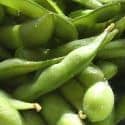
#8: Beans (Mature Soy Beans)
Protein in 100g 1 cup (172g) Protein to Calorie Ratio
17g 29g 1g protein per 10.4 calories
Other beans high in protein per cup cooked: Kidney Beans (17g), White Beans (17g), Lima Beans (15g), Fava Beans (14g), Black Beans (15g), Mung Beans (14g).

#9: Eggs (Especially Egg Whites)
Protein in 100g 1 Large Egg (50g) Protein to Calorie Ratio
13g 6g 1g protein per 12 calories
1 Egg White (33g) provides 4g protein, 1g protein to 4.4 calories. 1 cup of scrambled eggs (220g) provides 22g protein.
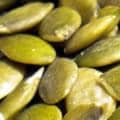
#10: Nuts and Seeds (Pumpkin, Squash, and Watermelon Seeds)
Protein in 100g 1 Ounce (28g) Protein to Calorie Ratio
33g 9g 1g protein per 15.8 calories
Other nuts and seeds high in protein (grams protein per ounce (28g)):Peanuts (7g), Almonds (6g), Pistachios (6g), Sunflower Seeds (6g), Flaxseed (5g), Mixed Nuts (4g).

#1: Fish (Tuna, Salmon, Halibut)
Protein in 100g 3oz Fillet (85g) Protein to Calorie Ratio
26g 22g 1g protein per 4.5 calories
Other fish high in protein per fillet(3oz or 85g): Tuna (22g), Salmon (22g), Halibut (22g), Snapper (22g), Perch(21g), Flounder and Sole (21g), Cod (20g), Tilapia (17g).

#2: Lean Chicken (Chicken Breast)
Protein in 100g 3oz serving (85g) Protein to Calorie Ratio
18.3g 16g 1g protein per 4.6 calories
More Chicken and Turkey: Chicken Leg - Drumsticks (60g) provides 16g protein. Chicken Thigh (37g) provides 9g protein. 3oz serving of Turkey Breast (85grams) provides 26g protein.

#3: Cheese (Non-fat Mozzarella)
Protein in 100g 1oz Slice (28g) Protein to Calorie Ratio
32g 9g 1g protein per 4.7 calories
Other cheese high in protein per ounce(28g): Low-fat Cottage Cheese (5g), Low-fat Swiss Cheese (8g), Low-fat Cheddar (6g), Parmesan (10g), Romano (9g). *Low or Non Fat Mozzarella and Cottage Cheese provide the most protein per calorie, full fat cheeses typically only provide 1g protein per 20 calories, and are less optimal sources of protein.

#4: Lean Beef and Veal (Low Fat)
Protein in 100g 3oz Slice (85g) Protein to Calorie Ratio
36g 31g 1g protein per 5.3 calories
T-Bone Steak 3oz (28g) provides 19g of protein, 1 Piece of Beef Jerky (20g) provides 7g of protein.

#5: Pork Loin (Chops)
Protein in 100g 1 Chop (137g,~5oz) Protein to Calorie Ratio
30g 41g 1g protein per 5.4 calories
Sirloin Roast 3oz (28g) provides 23g of protein, Ham 3oz (28g) provides 18g of protein, 1 slice of bacon (8g) provides 3g of protein.

#6: Tofu
Protein in 100g 3oz Slice (85g) Protein to Calorie Ratio
7g 6g 1g protein per 7.4 calories
1 cup (252g) of firm tofu provides 20g protein. 1 cup of soft tofu (248g) provides 16g protein. 1 cup of tempeh (166g) provides 31g protein.

#7: Yogurt, Milk, and Soymilk
Protein in 100g 1 cup (245g) Protein to Calorie Ratio
6g 14g 1g protein per 9.8 calories
1 cup skim milk (245g) provides 8g protein, 1 cup soymilk (243g) provides 8g protein.

#8: Beans (Mature Soy Beans)
Protein in 100g 1 cup (172g) Protein to Calorie Ratio
17g 29g 1g protein per 10.4 calories
Other beans high in protein per cup cooked: Kidney Beans (17g), White Beans (17g), Lima Beans (15g), Fava Beans (14g), Black Beans (15g), Mung Beans (14g).

#9: Eggs (Especially Egg Whites)
Protein in 100g 1 Large Egg (50g) Protein to Calorie Ratio
13g 6g 1g protein per 12 calories
1 Egg White (33g) provides 4g protein, 1g protein to 4.4 calories. 1 cup of scrambled eggs (220g) provides 22g protein.

#10: Nuts and Seeds (Pumpkin, Squash, and Watermelon Seeds)
Protein in 100g 1 Ounce (28g) Protein to Calorie Ratio
33g 9g 1g protein per 15.8 calories
Other nuts and seeds high in protein (grams protein per ounce (28g)):Peanuts (7g), Almonds (6g), Pistachios (6g), Sunflower Seeds (6g), Flaxseed (5g), Mixed Nuts (4g).


Comments
Post a Comment